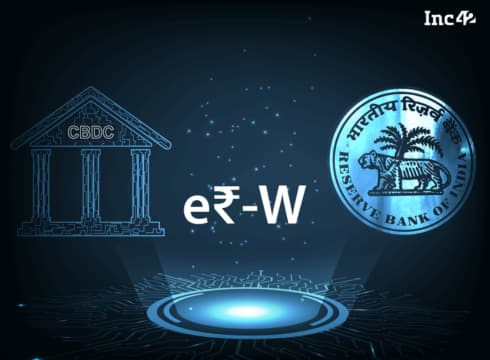It is too premature to state if there will be any impact on the Indian crypto market, but cryptocurrency has no future globally as of now: Mohandas Pai
The CBDC would allow the RBI to gain more direct control and influence over the enforcement of minimal market standards, believe experts
The central bank commenced the first pilot of digital rupee for the wholesale segment on November 1 and recorded 48 transactions worth INR 275 Cr
Inc42 Daily Brief
Stay Ahead With Daily News & Analysis on India’s Tech & Startup Economy
The Reserve Bank of India (RBI) commenced the first pilot of digital rupee for the wholesale segment (e₹-W) on November 1, 2022. The RBI said that the use case for this pilot will be the settlement of secondary market transactions in government securities. The use of e₹-W is expected to make the inter-bank market more efficient.
On the very first day of the pilot, the RBI recorded 48 transactions in G-sec worth INR 275 Cr. The IDFC First executed the first secondary market transaction worth INR 5 Cr.
The central bank also aims to bring down the use of cryptocurrencies through the digital rupee. Inc42 spoke to fintech experts and stakeholders to understand their perspective on the pilot launch of the central bank digital currency (CBDC).
Mohandas Pai, former CFO of Infosys and partner at Aarin Capital, applauded the move as a “good experiment”, but said it is too premature to state if it will have any impact on the Indian crypto market. “Cryptocurrency has no future globally as of now! Blockchain will grow,” he added.
CBDC Must Be Based On DLT: Blockchain Industry
Having discussed all the available options in its concept note for CBDC, the RBI has not yet clarified whether India’s CBDC (e₹) will be a conventional centrally-controlled database or distributed ledger technology (DLT)-based infrastructure.
Pratik Gauri, cofounder and CEO of blockchain startup 5ire, said, “At 5ire, we have already been working with the Goa Police and Muzaffarnagar Police. I am optimistic that when the RBI decides to look at the underlying technology for CBDC, they will strongly consider blockchain.”
A centralised system purposefully skirts innovation and development of a transparent and accountable system. Blockchain and decentralisation are necessary for the success of CBDC. The RBI should aspire to build a transparent and robust digital infrastructure, Gauri added.
The central bank in its concept note said that DLT could be considered for the indirect or hybrid CBDC architecture. Further, it may also be possible that some layers of the CBDC tech stack can be on a centralised system and the remaining on distributed networks. The choice of tech architecture shall also factor in the resource intensiveness and energy efficiency associated with the solutions.
Manan Vora, SVP – strategy and operations at digital asset management platform Liminal said, “The launch of CBDC will require a robust crypto security infrastructure in India to ensure hack-proof CBDC operations and prevent financial frauds.”
Will Further Reduce Transaction Cost
The digital rupee would be initially used for secondary market transactions in government securities, the RBI said, adding that settlement in central bank money would reduce transaction costs by pre-empting the need for settlement guarantee infrastructure or for collateral to mitigate settlement risk.
Going forward, other wholesale transactions and cross-border payments will be the focus of future pilots, based on the learnings from this pilot, it added.
On further use cases, Ankit Wadhwa, cofounder & CEO of NFT platform Rario said, “The digital rupee will add significantly to our financial economy, wherein users can make verifiable and trackable transactions. Considering it is governed by a central authority, the volatility risk associated with other digital currencies such as Bitcoin is not there while transacting, and tracking the transactions will become easier for the government and users alike.”
Sathvik Vishwanath of Unocoin said that the CBDC will help immensely in real-time settlement and cost-effectiveness in the pilot project and pave the way for a range of use cases over time, both for intra-country and cross-border transactions.
It may also boost liquidity, remove inefficient and redundant processes while reducing transaction costs. Arjun Khazanchi cofounder and chief legal and strategy officer at Rooba.Finance, said that it would also lead to higher transparency between the participants.
“Through this, the government expects to also be able to reduce settlement risk which is one of the biggest use cases for the blockchain in financial markets. The current settlement and clearing process will appear quite archaic post this development and feasibility study.
There are some fears regarding the privacy and overt control that the government may possess over CBDCs,” he added.
Globally, central banks have struggled to achieve efficiencies in areas such as cross-border payments. However, CBDC can change this. Manish Sharma, founding partner at Centricity Wealth Tech, said, “A CBDC alternative would allow more direct control and influence over enforcement of minimal market standards.”
Complete Launch Still Away
“Despite the pilot, the complete launch is still very far away. The pilot will run for a minimum 18-months duration if it goes in accordance with the plan. However, given the nature of India’s CBDC requirement, there will be of course certain challenges such as zero downtime and scalability requirements for 1.2 Bn people, the pilot may extend further,” sources close to the development told Inc42.
While the RBI has announced plans to launch retail CBDC next month, Khazanchi believes that the launch is still far away and would require a lot of education and technical training before it.
For the wholesale CBDC pilot, the RBI has onboarded nine banks – State Bank of India, Bank of Baroda, Union Bank of India, HDFC Bank, ICICI Bank, Kotak Mahindra Bank, Yes Bank, IDFC First Bank and HSBC.
{{#name}}{{name}}{{/name}}{{^name}}-{{/name}}
{{#description}}{{description}}...{{/description}}{{^description}}-{{/description}}
Note: We at Inc42 take our ethics very seriously. More information about it can be found here.


